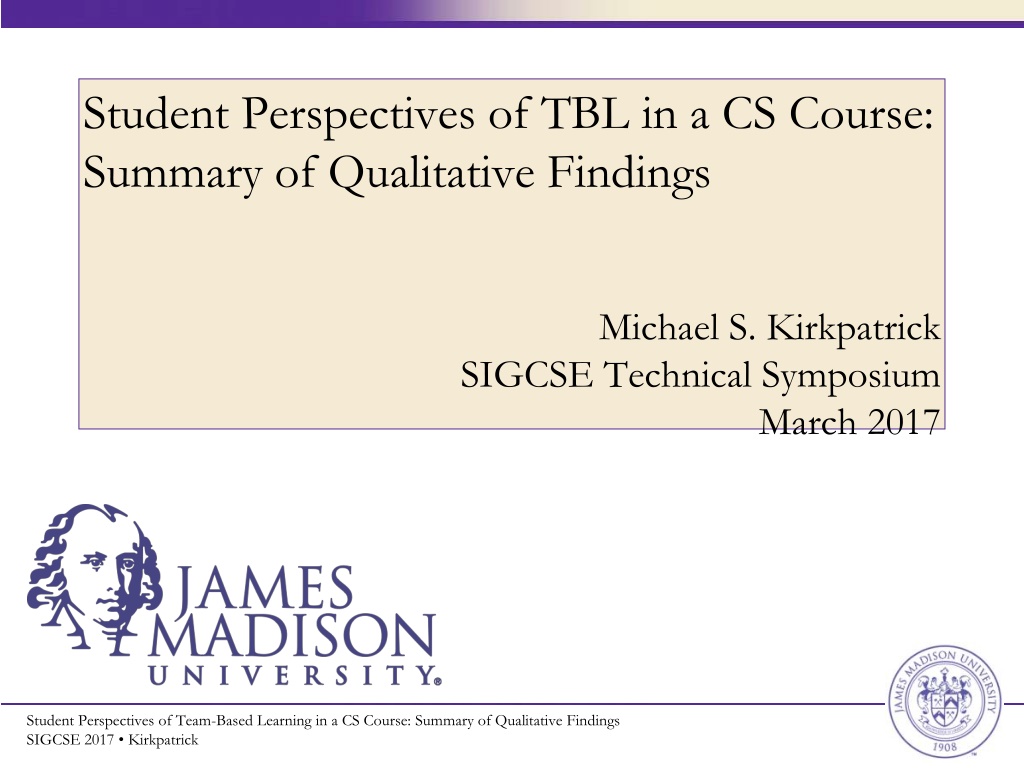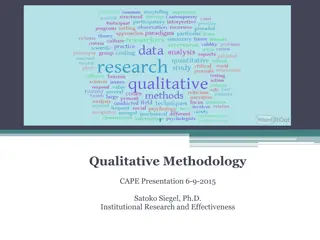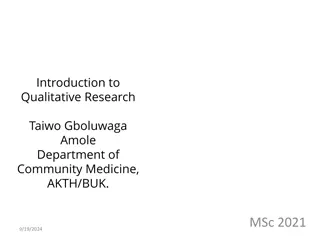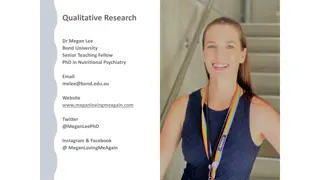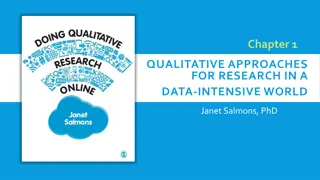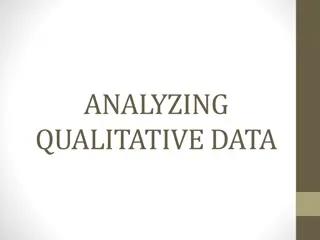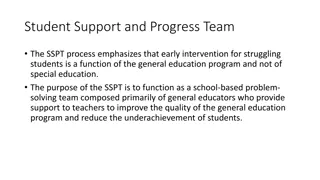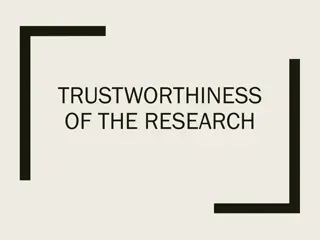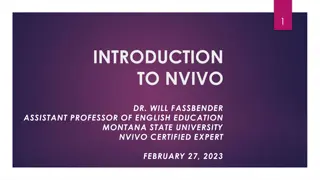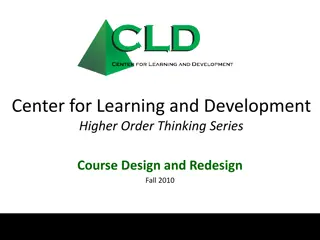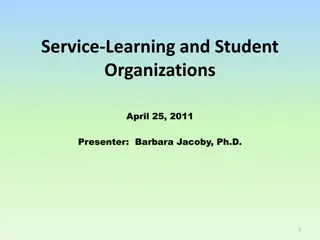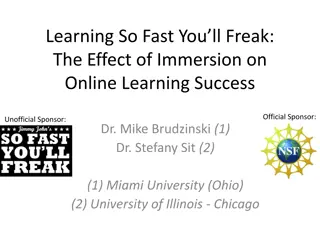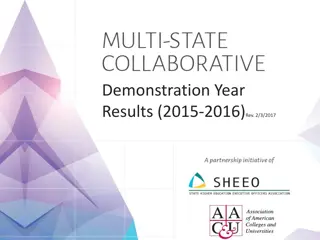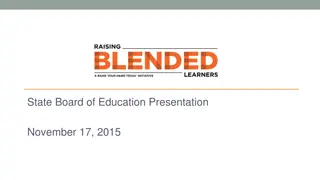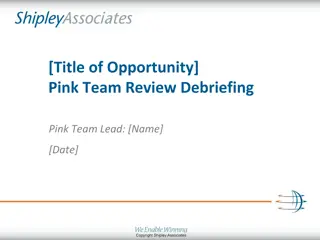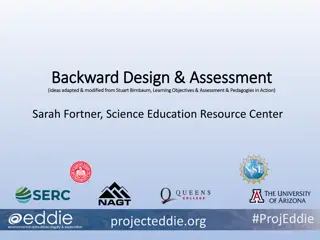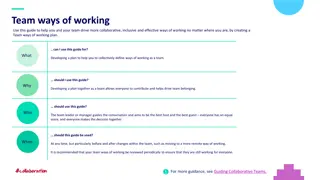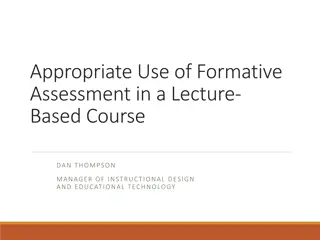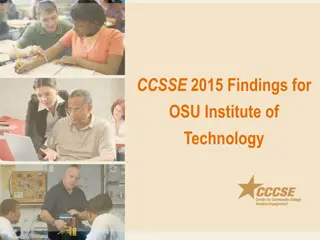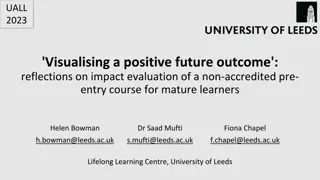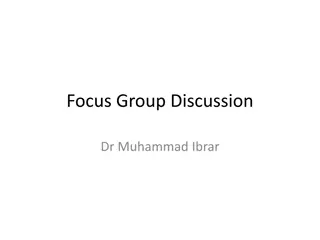Student Perspectives of Team-Based Learning in a CS Course: Qualitative Findings
Qualitative findings from a study on Team-Based Learning (TBL) in a CS course, discussing TBL implementation, pre-module preparation, readiness assurance process (RAP), application activities, major assessments, and prior results. The study explores student perspectives on TBL methodology and its impact on learning outcomes.
Uploaded on Sep 16, 2024 | 0 Views
Download Presentation

Please find below an Image/Link to download the presentation.
The content on the website is provided AS IS for your information and personal use only. It may not be sold, licensed, or shared on other websites without obtaining consent from the author. Download presentation by click this link. If you encounter any issues during the download, it is possible that the publisher has removed the file from their server.
E N D
Presentation Transcript
Student Perspectives of TBL in a CS Course: Summary of Qualitative Findings Michael S. Kirkpatrick SIGCSE Technical Symposium March 2017 Student Perspectives of Team-Based Learning in a CS Course: Summary of Qualitative Findings SIGCSE 2017 Kirkpatrick
TBL implementation Team-based Learning (TBL) Flipped pedagogy developed by Larry Michaelsen Course divided into 5-7 modules Founded on constructivism and group process dynamics Preparation (Pre-Class) Readiness Assurance Diagnostic - Feedback Application of Course Concepts 45-75 minutes class time 1-4 hours class time 1 2 3 4 5 Instructor Feedback 6 Individual Study Application Oriented Activities Written Appeals Team Test Individual Test Student Perspectives of Team-Based Learning in a CS Course: Summary of Qualitative Findings SIGCSE 2017 Kirkpatrick
Pre-module preparation Student Perspectives of Team-Based Learning in a CS Course: Summary of Qualitative Findings SIGCSE 2017 Kirkpatrick
Readiness Assurance Process (RAP) Student Perspectives of Team-Based Learning in a CS Course: Summary of Qualitative Findings SIGCSE 2017 Kirkpatrick
Application activities Student Perspectives of Team-Based Learning in a CS Course: Summary of Qualitative Findings SIGCSE 2017 Kirkpatrick
Major assessments Module 1 Module 2 Module 3 Module 4 Module 5 Module 6 Team Exam Individual Exam Team Exam Final Exam Project 1 Project 2 Project 3 Project 4 Student Perspectives of Team-Based Learning in a CS Course: Summary of Qualitative Findings SIGCSE 2017 Kirkpatrick
Prior results (ITiCSE 2015) Kirkpatrick, M.S. and Prins, S. Using the Readiness Assurance Process and Metacognition in an Operating Systems Course. 20th Annual Conference on Innovation and Technology in Computer Science Education (ITiCSE), July 2015, http://dx.doi.org/10.1145/2729094.2742594. Student Perspectives of Team-Based Learning in a CS Course: Summary of Qualitative Findings SIGCSE 2017 Kirkpatrick
Do students perceive value in using TBL in CS classes? Does this perception change? Student Perspectives of Team-Based Learning in a CS Course: Summary of Qualitative Findings SIGCSE 2017 Kirkpatrick
Setting Master s university, very high undergraduate More selective, full-time, lower transfer-in CS department is primarily undergraduate 300-level Computer Organization 30 sophomores, 47 juniors, 34 seniors (111 total) 28+27 using TBL (one instructor) 27+29 using traditional lecture (different instructor) Student Perspectives of Team-Based Learning in a CS Course: Summary of Qualitative Findings SIGCSE 2017 Kirkpatrick
Mixed-methods design Quantitative Qualitative Value of Teams Survey (VTS) Semi-structured focus groups in 12thweek Working with Peers 8+6 participants (each team represented) Value of Group Work Anonymized transcripts Open & axial coding No inter-rater reliability Student Perspectives of Team-Based Learning in a CS Course: Summary of Qualitative Findings SIGCSE 2017 Kirkpatrick
Transcript coding results 20% 20% 15% 20% 15% 10% Value of in-class collaboration Factors influencing success Team tests Team formation RAP difficulties Other Student Perspectives of Team-Based Learning in a CS Course: Summary of Qualitative Findings SIGCSE 2017 Kirkpatrick
Value of in-class collaboration Correct answers emerged from discussion Mixed feelings on making projects collaborative Greater learning, but difficult "Even if everyone didn t know the answer exactly, like when we talk about it we somehow come up with an answer. [I]t s easier to ask your peers that are in your immediate group if you don t understand something. I mean as programmers we re gonna be working on teams and developing software programs. I made a joke along the lines of as a group we work really well together, but as an individual entity we all suck. I would say it was harder to do things out of class, but in class was a lot more valuable time. I think there are others that might use that as a way to cruise. Student Perspectives of Team-Based Learning in a CS Course: Summary of Qualitative Findings SIGCSE 2017 Kirkpatrick
Team formation is problematic Survey-based team assignment can be manipulated, but no better choice Split opinions on balanced vs. unbalanced teams I think maybe if that was improved then the teams could be more balanced... I feel like there could be better ways to balance the groups and that would really enhance the experience. [I]t all depends how honest you are on the survey too. Cuz if you say that, Okay, I m not proficient in this, and then you actually are, and then you re put in the group with a bunch of a people who are really good at it. If he puts you in the group [with] people who don t know, I feel like then you guys will work harder You guys will teach each other, like, Hey, guys, we don t have anyone that really knows the stuff in the group, so we re gonna work hard to get it. That s not to say that I d like to choose the groups on my own because I feel like that could be unfair to the people who don t know anybody. Student Perspectives of Team-Based Learning in a CS Course: Summary of Qualitative Findings SIGCSE 2017 Kirkpatrick
Factors that influence success Preferred effort and formative evaluation over ability Team structure mostly encourages accountability Team dynamics create risks [I]f you have [mixed ability groups], they re supposed to try and teach them, but they re introverted or don t care, they re not gonna teach anything to us. If you feel that they re gonna rely on you, then you might be more inclined to make sure that you read and make sure you know. I d rather have you try and get the answer wrong than just to sit there and not do anything at all. [A:] I feel like [peer evaluations] should be maybe twice during the semester. [B:] I know. Cuz at the end of the semester what good is it gonna do [chuckles]? They would go into that stuff so fast, and I was literally so lost. I had so much anxiety the first couple of weeks because I didn t know what was going on. They didn t wanna take the time to explain it to me. [I]t s kind of a self-correcting system. I mean eventually they might kind of reap the rewards for a while, but you re gonna face what s happening in the class. Student Perspectives of Team-Based Learning in a CS Course: Summary of Qualitative Findings SIGCSE 2017 Kirkpatrick
RAP frustrations Reading assignments are insufficient preparation RAP reveals misunderstandings Sometimes RAP is insufficient feedback He gives you a reading, but it s not...this is not like a history class where you just read it and get all the materials there. It s kinda hard. I feel a certain point of this is to show you how wrong you are in thinking whatever you thought you knew from studying They re not gonna not everyone s gonna explain every single answer that they put, and then they re like, Okay, we got that right, but you still have no idea why that was the right answer. [T]he iRAT would show me what I think I know versus what I don t know, which is usually 70 percent or whatever. Then the tRAT sort of allows us to collectively come together and reason out why. We basically had to teach ourselves and then we got graded on that. Then we wouldn t learn...until we did the activity, which was after the quiz, so not very effective. Student Perspectives of Team-Based Learning in a CS Course: Summary of Qualitative Findings SIGCSE 2017 Kirkpatrick
Team exams New process skills and new test- writing approach required [I]f we start a problem and then I say what I think the answer is and then my group, they disagree, then we have to talk about it. If we split up the team exam into different sections so certain people do certain parts, that defeats the point of it. [W]e had that idea in the back of our mind, like we practiced that the day before and we had a strategy. That was something we vocally talked about the day before our second exam cuz we didn t do quite as well on our first exam. Talking about pacing ourselves. Student Perspectives of Team-Based Learning in a CS Course: Summary of Qualitative Findings SIGCSE 2017 Kirkpatrick
Recommendations Be transparent about the process of assigning students to teams. Use objective metrics to the extent possible. Provide explicit instruction for TBL process skills, including how to prepare for team exams and the iRAT. Supplement reading assignments with scaffolding materials to facilitate achieving desired learning objectives for the RAP. Consider replacing or augmenting the iRAT with a pre-class online quiz. Ask for additional points of confusion after addressing commonly missed tRAT questions. Make team exams shorter than individual exams to allow for discussion and to be mindful of the impact of absences. Provide time estimates for team exam problems. Student Perspectives of Team-Based Learning in a CS Course: Summary of Qualitative Findings SIGCSE 2017 Kirkpatrick
Thank you kirkpams@jmu.edu Student Perspectives of Team-Based Learning in a CS Course: Summary of Qualitative Findings SIGCSE 2017 Kirkpatrick
